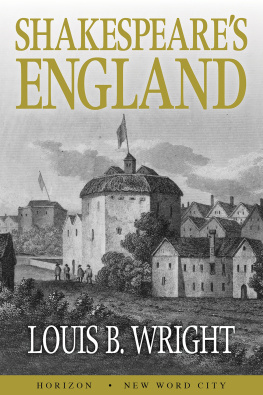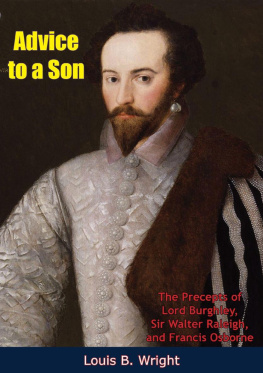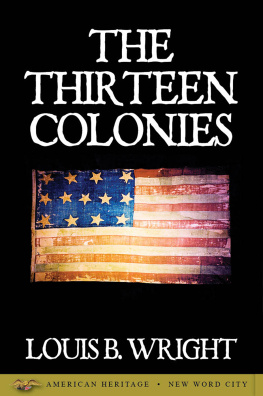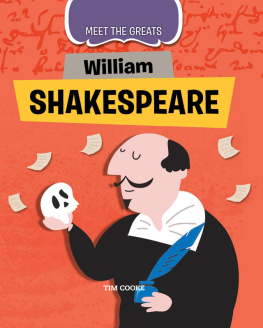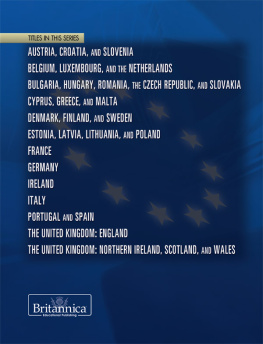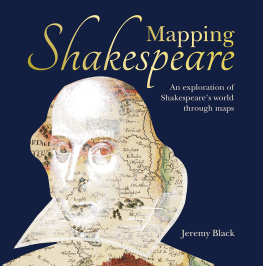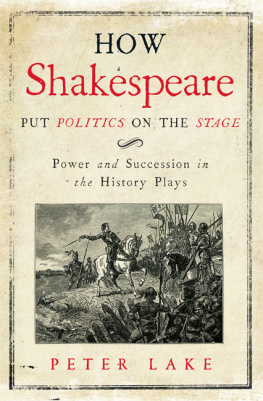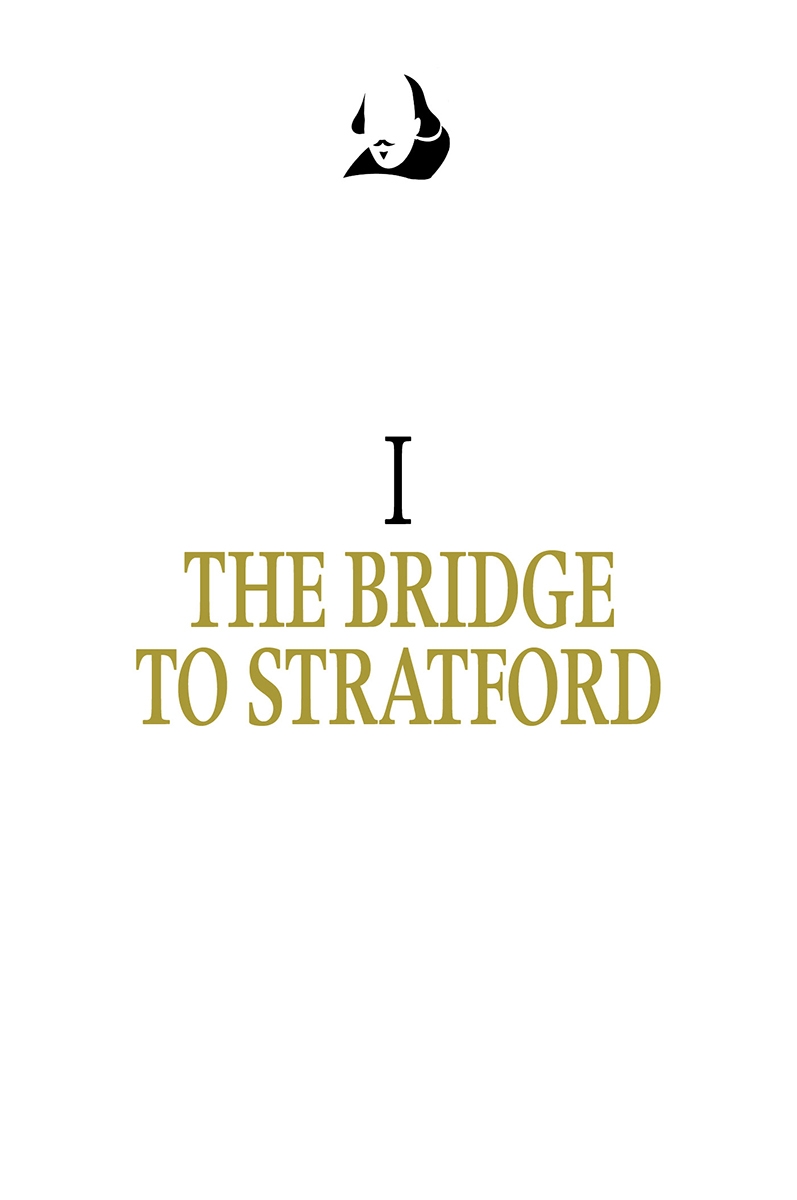Elizabeth I, Englands greatest queen, had but a short time to live. She left her London residence at Whitehall after Christmas 1602 and made the brief river journey to Richmond Palace. She arrived in the midst of a chilling January downpour, and there she waited, her remarkable mind perfectly aware of her failing health, her sharp glance missing nothing.
Some great monarchs of history have chosen to die with the treasures of their kingdoms piled high about them. But Elizabeth commanded a distinguished company of players to come and entertain her - the Lord Chamberlains Men. They arrived at the palace gates in February 1603, a troupe of perhaps six well-known actors and their assistants. At one end of a lofty hall, they set up their platform stage. The musicians sounded a flourish, and the brilliantly costumed queen feasted her eyes on the dramatic spectacle. A few weeks later, she died and an era ended.
William Shakespeare was a senior member of the Lord Chamberlains Men. He was fully aware of the honor Elizabeth had bestowed on his troupe at Richmond and on many previous occasions. Not yet forty, he had risen to prominence in the preceding decade and would live to enjoy new triumphs in the decade ahead. As Londons bells tolled the sad news of the queens death, he must have considered how many blessings her reign had brought him. And perhaps sharp memories flashed through his mind: his childhood in Stratford, his early days as a newcomer to London, the building of the famous Globe Theater (of which he was now a part owner), his lively contacts with all manner of men and women.
It is possible for writers today to recreate these scenes from the past with some accuracy, thanks to 350 years of Shakespearean scholarship and tradition. However, what Shakespeare felt or how he conducted himself in each scene is somewhat more difficult to determine, for the basic materials are sparse. There are legal papers such as his marriage license and his will, the records of his childrens baptism, a few mentions of his professional skills in the writings of others, and information carved on his tombstone. There also are old biographies, but none of them yield much more information than the musty records themselves.
The first attempt to put the known events of Shakespeares life in order was published in 1662, forty-six years after he died. A clergyman named Thomas Fuller included Shakespeare in a collection of biographies of worthy Englishmen. Although Fullers account was padded with irrelevant material, it was at least conscientious. The author was not sure of the date of Shakespeares death, and he left a blank so the information could be filled subsequently.
Later in the seventeenth century, there were two other attempts to chronicle Shakespeares life, but these manuscripts were never released to the public. The next published biography did not appear until 1709. It was written by Nicholas Rowe to accompany a six-volume edition of Shakespeares plays. Although the Rowe biography was brief and to the point, it contained a lot of inaccurate information; it was based mainly on stories the author had heard and not on contemporary accounts. By Rowes time, everyone who had known Shakespeare or who had had any firsthand knowledge of him was dead.
Some biographers have tried to make up for this lack of contemporary material by looking for hints about Shakespeares life and personality in his writings. Others, frustrated by the lack of evidence, have dared suggest that Shakespeares works were written by someone else. Nevertheless, from certain biographies and scholarly writings, enough knowledge can be gleaned to yield many vivid images of Shakespeare and his England as he rose to prominence - and then to greatness - in the theater.
The first professional acting company to begin making regular visits to Stratford rode into town on a summers day in 1568. The men had come over the dusty road from London - some on foot, some on horseback - with their costumes, props, and musical instruments trundling along in a wagon behind them. Without pause, they rumbled over Clopton Bridge, the sound of their horses hooves and the wagon wheels echoing hollowly from beneath the stone arches. Then the troupe slowed their pace, for Bridge Street was a busy thoroughfare. There, in addition to the children flocking to greet the newcomers, were the tradesmen - bakers, cobblers, smiths - whose shops lined the street and whose wares were often displayed on tables in the town square.
After proceeding to the town hall, the actors were welcomed officially by the mayor, or high bailiff, as he was called then. The man who bore this title in 1568 was John Shakespeare, father of the playwright. An ambitious and successful man, John Shakespeare wore his scarlet, fur-trimmed robe with the dignity of a nobleman, but he was not an aristocrat. He had reached Stratfords highest office by being as forceful and businesslike in civic affairs as he was in his own trade of glovemaking. His rise to posts of prominence also had been helped by his marriage to Mary Arden, daughter of a prosperous landowner in nearby Wilmcote.
Touring players needed the sanction of civic officials before they could perform in a town. Thus, a theatrical performance in Stratford took place first in the town halls main room - a long, narrow chamber with a scaffold set up at one end to serve as a stage platform. The trial performance that was given in this chamber was free to as many people as could be squeezed in, for the actors would be paid by the town council. No doubt, John Shakespeare, as the towns most important official, had the best seat in the room. And his son William, who was four at the time, may have been with him.
Shakespeares England
In 1587, at Fotheringhay Castle, Queen Elizabeths cousin and rival, Mary Queen of Scots, was beheaded. A year later, the famous Spanish Armada, which had been dispatched against England partly because of Marys execution, was defeated in the English Channel. It was at that time that William Shakespeare, an impressionable and restless young man, left Warwickshire and the happy associations of Stratford and trudged to London. To him, it must have seemed as if all England were a stage on which historic and bloody events were being enacted; thus, it is not surprising that when the Globe Theater in which he was part owner was built in 1599, the Latin motto over the door was All the worlds a stage. Yet, as the sixteenth century drew to a close, the events of Shakespeares own theater life - the provincial tours and court performances - became nearly as important to the development of English culture as any rebellion or conflict of the past.
Most of the plays brought to towns and cities in provincial England were full of moral preachments and lessons in righteousness. No doubt the meaning of these plays was beyond the ken of young Shakespeare and other Stratford children. But if the young people missed the point of a play, they were probably stirred by its physical action and its success as an exercise in make-believe.
Provincial theater left much to the imagination of its audience. There were no lighting or scenic effects, few props, and none of the trappings that were later used to suggest real surroundings. The acting was vigorous, and it tended to be exaggerated instead of realistic. Performers relied mainly on the volume and pitch of their voices to convey youth or age, virtue or wickedness.
The touring companies were small, well-practiced groups of six or seven actors. These men were usually so versatile and so adept at making quick changes that they could easily present a play of many characters. The actors learned to play more than one role in a single performance, but only the leading actors in a company had a choice of parts. The major roles in the popular dramas of the day were passionate and violent. Scenes involving madness and murder were frequent, and they were not played with restraint. A bladder of animal blood might be concealed in the actors costume to spurt forth at the critical moment in an axing or a stabbing.

